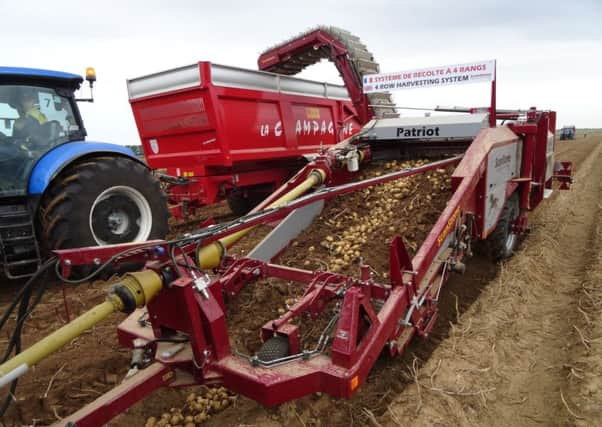Brexit could be a mixed blessing for potato sector
This article contains affiliate links. We may earn a small commission on items purchased through this article, but that does not affect our editorial judgement.


Speaking at the country’s foremost sector event, Potatoes in Practice (PiP), held outside Dundee yesterday, David Swales, head of strategic insight with the Agricultural & Horticultural Development Board (AHDB), said that, while most other areas of agriculture needed frictionless trade with the EU to remain viable, “a bit of friction” would actually be good for ware growers.
• READ MORE: Farming news
“The domestic market is very important for those who grow ware crops – and as the country also imports a lot of value added processed potato products, import substitution would offer considerable opportunities for this sector of the UK potato industry,” he said.
Advertisement
Hide AdAdvertisement
Hide AdHowever, he admitted that the situation was slightly different for Scotland, where a deal of the focus was on seed production.
“And while trade barriers could impact on business with the EU itself, on the wider front a lot of our seed export deals hinge on trade deals hammered out as part of the EU. When we leave these could be at risk.”
Swales said that without a deal similar to that already standing, those supplying seed to existing important markets such as Morocco could face tariffs of up 40 per cent to get seed into that country.
• READ MORE: Scottish potato exporters eyeing new market in Kenya
However, all was not doom and gloom on the seed export front, with Rob Clayton, sector strategy director with AHDB Potatoes, stating that a greater appreciation of what Scotland had to offer in many other countries could lead to new markets.
He said that a deal had been struck with Brazil which had seen a harmonisation of seed certification standards, opening doors to supplying seed to the country which currently produces 3.6 million tonnes of potatoes a year.
Scotland’s world-renowned potato scientists are set to play a key role in the development of a new £3 million research facility to be built in China – home to the world’s largest potato industry.
Advertisement
Hide AdAdvertisement
Hide AdIt follows a visit to PiP last year by China’s self-styled “King of Potato”, Liaing Xisen, whose business accounts for almost one-third of the country’s huge potato crop.
• READ MORE: Push to make the humble potato a Chinese staple
Discussions between his head scientist, Dr Hu, and sector specialists at the James Hutton Institute (JHI) and other Scottish researchers were set to take place this week following this year’s PiP with the aim of thrashing out how the joint potato laboratory would be set up and function.
Professor Ian Toth of the JHI said that becoming involved in the new laboratory in China would offer considerable opportunities for Scottish scientists to share ideas, techniques and research with their counterparts in Asia.
“And while this arrangement represents a significant stepping stone, such international co-operation is also likely to open up access to more research funding from UK sources, both government and commercial,” said Toth.
He added that a high-level delegation of scientists from India – which stood second only to China in terms of potato production – was also visiting the event to see how research opportunities could best be explored.
GM ban ‘leaves Scots trailing’
Scotland’s farmers risk being left behind if the current Scottish Government does not review its position on GM crops, it was claimed yesterday.
Speaking only days after rural economy secretary Fergus Ewing requested a commitment from the UK government that Scotland’s current ban on growing such crops could continue after Brexit, Tory MSP Peter Chapman accused the SNP of “playing politics” rather than listening to the science.
Advertisement
Hide AdAdvertisement
Hide Ad“My view on this has always been that we have to give due regard to the science,” said Chapman.
“If the science tells us that GM crops are safe, and there is no doubt in my mind that is the case, then there is no issue. The argument here is not about Brexit. There are already countries within the EU that allow GM.”
Chapman said that the issue was a UK one – but added that it would have to be resolved as Scotland’s farming industry would not remain competitive if England and Wales chose to go down a different route.
Citing work on GM blight resistant potatoes, he said: “The Scottish seed potato sector would simply not survive if GM crops were cultivated elsewhere in the UK and we continued with the ban on GM crops.”